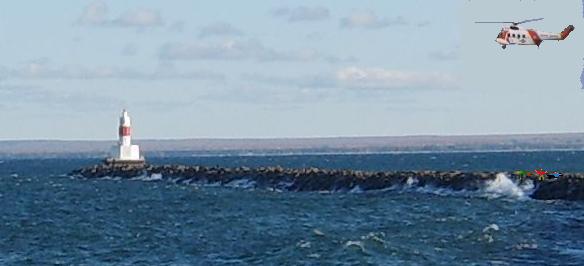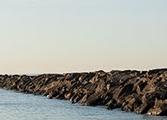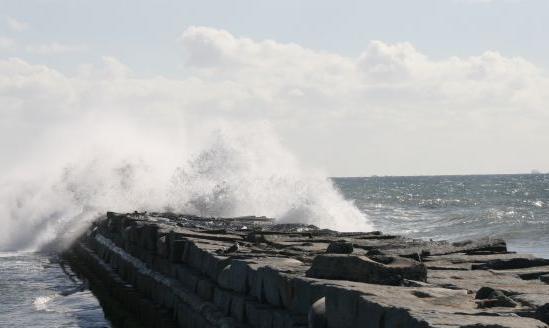“Soapsuds and Seaweed”
By Ross
The sink in Los Angeles County Fire Station 51’s kitchen was filled with soaking dishes. It’s rec’ room was cluttered with open, but unread, newspapers and magazines.
The unfinished chores were a testament to A-Shift’s grueling tour of duty.
Now, with less than twenty minutes to go before the shift-change, the six exhausted firefighters were still hard at work.
Captain Hank Stanley and his crew intended to leave things in ‘ship-shape’ order.
So it was, that fireman John Gage found himself up to his elbows in dirty dishwater.
His ‘helpful’ shiftmate, Chet Kelly, tossed a greasy pan into the sink.
John quickly clamped his jaws shut and his eyes closed, as the flung frying pan sent soapsuds flying up into his face and hair, and down onto the front of his freshly donned uniform. Gradually, the paramedic’s squinting eyes reopened. He snorted the soap bubbles from his nostrils and blew them from his lips. Gage gazed down at his suds-covered chest for a few moments before turning to give the pan flinger an annoyed glare.
The mischievous gleam in the Irishman’s green eyes belied his shoulders’ apologetic shrug.
John raised his red, wrinkled hands up out of the hot water and wrang his dishrag out—in lieu of Chet’s neck.
Kelly coughed a couple of times and was wisely going to take his leave—when the claxons suddenly sounded.
“Squad 51…” the dispatcher’s voice blared, from a wall-mounted speaker out in the garage.
Speaking of flinging things…
John whipped his wet rag at Chet’s mustached face, and promptly followed his paramedic partner, Roy DeSoto, from the room—at a trot.
Kelly caught the soggy dishcloth, in self-defense, and reluctantly stepped up to the sink.
“…meet the Coast Guard helicopter at the County Airport…” the dispatcher continued, as the rescuers climbed aboard their truck. “Lot 10…County Airport…Lot 10…Time out: 07:41.”
“Squad 51. KMG-365,” their Captain calmly acknowledged. “Looks like you two are in for some overtime,” he noted, prior to handing the truck’s driver a copy of the call slip.
“Yeah,” Roy unenthusiastically replied, and passed the piece of paper on to his partner. “Cap, can you call Joanne for me, and let her know I’m gonna be a little late getting home?”
“No problem,” Stanley assured him.
“Thanks, Cap!” the father of two called out his open window, as the truck took off.
Hank watched the Squad exit the garage and then go heading off in the direction of the County Airport, with its warning lights flashing and its siren wailing.
“Man, I hate these Coast Guard calls,” Gage griped, speaking loud enough to be heard over their truck’s blaring siren. “We usually end up in the ocean, and I usually end up shaking sand and seaweed out of my hair. Not to mention that salt water is murder on my shoes—which, by the way, are still damp from yesterday.”
While extricating a victim at a TA the previous afternoon, a fuel leak had ignited and the protective stream from Marco’s reel line had managed to soak the paramedic’s feet, right along the encroaching flames.
“I hate ‘any’ and ‘all’ calls that come in right before the shift-change,” Roy admitted right back. “Whether they’re in the ocean—or on dry ground.”
The two unhappy paramedics swapped a pair of sympathetic glances.
Within less than six minutes, they reached the County Airport. The truck’s lights were flicked off and its siren was silenced.
A huge, Coast Guard colored—bright-orange and white—helicopter had landed in the middle of Lot 10, and was patiently awaiting the pair’s arrival, its enormous rotor blades lazily ‘chop-chop-chop’ing their way through the crisp, early morning air.
DeSoto pulled up and parked, just as close to the ‘warming up’ aircraft as he possibly could.
The duo baled out and grabbed a bunch of medical gear from their squad’s side compartments before finally heading over to the helicopter.
A Coast Guard crewman helped the paramedics aboard and then safely stowed their equipment for them.
“Thanks!” the firemen told him—in unison.
Gage and DeSoto dropped into some window seats, directly behind the cockpit, and strapped themselves in.
The chopper’s pilot began to rev’ up the aircraft’s idling engine. “Tower, Coast Guard Rescue Flight 2290. The paramedics are onboard and we are ready for takeoff…”
“Coast Guard 2290, this is Tower. You have clearance for takeoff.”
The firemen couldn’t catch the rest of the pilot’s words, as the noise level in the cabin quickly became deafening.
The paramedics pulled some mic’ed headsets on and plugged them into the communication jacks beside their window seats.
Gage, who was seated directly behind the cockpit, thumbed his mic’s transmit button. “What’s up?”
“Welcome aboard, gentlemen,” the helicopter’s co-pilot came back. “Some boaters have failed to heed our small-craft warnings. We’ve received several reports that a small craft has collided with the breakwater. Supposedly, four people were onboard. We’re still searching for one of them. The other three have been spotted on the breakwater, about a quarter of a mile from the Channel Lighthouse. With the surf as rough as it is right now, we felt it would be quicker and safer to attempt an air rescue.”
“Sounds like you guys have everything under control,” DeSoto determined. “Why do you need us?”
“According to witnesses, two of the three survivors on the breakwater haven’t been moving much. They could be seriously injured. Before we go airlifting them outta there, we thought you guys should probably take a look.”
“When’s the Coast Guard gonna start training paramedics?” Gage wondered with a wry grin.
“When are you paramedics gonna start training chopper pilots?” the Coast Guard Captain teased right back.
Everyone within earshot was forced to chuckle.
There was a slight lurch, as the aircraft suddenly began its ascent.
In practically no time at all, the helicopter was hovering over the L.A. Harbor breakwater, about a quarter of a mile from Lighthouse Point.

“We’re gonna hafta lower you guys,” the Captain announced. “If we try to set this thing down, we could blow those three right off the breakwater.”
“Right!” the paramedics simultaneously replied.
Gage and DeSoto quickly unbuckled and then donned a couple of water rescue harnesses.
A Coast Guard crewman slid one of the chopper’s side doors open and a hydraulically operated, cabled boom was swung out—and away—from the hovering aircraft.
John clipped his harness to the clamp on the end of the suspended cable and allowed himself to be swung—out of the open door…and into space.
The hydraulic hoist began to grind. The cable began to unwind.
The first rescuer was lowered onto the breakwater, forty feet below. The paramedic unclipped from the cable and it was quickly hoisted back up to the hovering helicopter.
DeSoto descended, a few moments later.
Finally, their gear made the trip, securely strapped inside a Stokes stretcher.
They each picked up an end of the basket and began making their way over to the survivors.
The huge chunks of concrete they had to traverse were really wet and extremely slippery. So the going was slow. A little too slow, perhaps.
“Hurry!” one of the shipwreck survivors—a young woman, wearing a bright red nylon windbreaker, urged.
“We’re getting there just as fast as we safely can,” Gage assured the girl. “What’s your name?”
“Karen. Karen Vincent. Help them! Please!” the pretty miss pleaded.
The rescuers slipped and slid over to where the three victims were, and set their heavy burden down on the breakwater.
“Have they found Mandy?” the close to hysterical young lady inquired.
Gage gripped the agitated girl’s shoulders. “The Coast Guard is still searching for her. I need you to calm down. We’re gonna take good care of you—and your friends. Try taking some nice, deep breaths. That’s it…deep and slow. Are you hurt anywhere?”
Karen shook her soggy blonde head.
“Good. Now, I want you to sit right down here, and I’m gonna go help my partner. Okay?”
This time, the girl nodded.
“I’ll gather their vitals,” Roy volunteered. “You get on the line with Rampart.”
“Right!” Gage acknowledged and grabbed their Bio-phone. He dropped onto the wet concrete, opened the bright orange case and inserted the call stick. The fireman covered one ear and pressed the radio’s handset up snug against his other. “Rampart Base, this is County 51. Do you read?…Come in, Rampart…” he continued, when no reply was forthcoming.
“This is Rampart,” his favorite physician finally acknowledged. “Unit calling in, please repeat…”
“Rampart, this is Squad 51. We have two victims of a shipwreck. Standby for vitals,” the relieved paramedic requested.
“Standing by, 51…” Dr. Kelly Brackett quickly came back.
John took the small piece of paper his partner passed to him and began reading aloud from it. “Rampart, this is 51. First victim is a male, approximately 20 years old. He’s semi-conscious. Pupils are equal and reactive. BP is 160/70. Pulse is 90. Respirations are 25 and labored. He’s cyanotic and diaphoretic. He has minor lacerations on his face and neck. His abdomen is rigid and distended. Possible fractured left pelvis. Victim one is in extreme pain,” he finished and released the transmit button.
“51, please repeat,” Brackett ordered. “There seems to be some kind of interference. I could hardly hear you.”
Gage exchanged a glum glance with his partner. Between the roar of the wind, and the sound of the surf crashing over the breakwater, it was not surprising that Brackett hadn’t heard him. John drew a deep breath in and tried, once again, to relay their victim’s vital signs, this time, shouting into the phone.
“…Victim one is in extreme pain! Did you copy that, Rampart?!” The fireman finished shouting and knelt there, massaging his throbbing left temple. All that screaming had given him a headache. Needless to say, the paramedic was relieved to hear that the good doctor had understood each and every word—that time. He wrote down—and loudly repeated—Dr. Brackett’s long list of orders, and then traded slips of paper with his partner.
“Want me to take over for you?” DeSoto volunteered.
“Nahhh. No sense in the both of us getting a headache,” Gage replied with a half-hearted, and slightly crooked, smile. He raised the radio’s handset back up to his right ear and began shouting—er, briefing Brackett in on their second victim’s condition.
The two firemen followed the physician’s instructions—to the letter, and, in just a matter of minutes, the two seriously injured young men were ready to transport.
Roy packed up their gear.
John removed the HT from his belt and thumbed its send button. “Squad 51 to Coast Guard helicopter! Ready to transport!”
The cable was re-lowered and, one by one, the three shipwreck victims were hauled aboard.
DeSoto clipped his harness to the cable. He was just about to be pulled up, when their radio suddenly squawked to life.
“Squad 51,” the chopper pilot piped up. “We’ve spotted the fourth survivor. She’s lying at the base of the breakwater, on the seaward side, about 200 yards from your position—heading away from the point.”
“One of us needs to stay with our patients,” DeSoto reluctantly determined.
“Go on up,” Gage agreed. “Ask the pilots to swing me over there. Hey, it beats slipping and sliding,” he explained, upon catching his partner’s questioning glance.
Roy gave his lazy buddy an eye roll, and some sound advice. “Try to keep your shoes out of the salt water.”
John responded with a nod—and a grin.
DeSoto was hauled aboard the hovering helicopter.

As Gage glided through the brisk, breezy air, he noticed that the tide must be coming in. Because the windblown waves were hitting higher and higher up—high enough to sweep their third victim right off of the breakwater! “Okay! I can see the girl!” he shouted into his radio. “Set me down, and then lower the gear! Hurry! The tide’s rising—fast!” The fireman’s feet hit the top of the breakwater. He unclipped from the cable and it was quickly pulled up and away.
Moments later, another Stokes descended. The stretcher contained a backboard, their Trauma box and some splints.
The paramedic released the cable and it was quickly hoisted up, out of his way. He grabbed a Cervical collar from the Trauma box and started making his way down to where a motionless young woman—in a bright yellow windbreaker—lay, with the waves lapping at her bare, and bleeding, legs.
Gage slipped and slid down to their unconscious victim’s level. Just as he got there, a huge wave hit. He braced himself and latched onto the young lady’s left wrist. The rescuer was rewarded with a cold, salty shower. He slipped the C-collar into place and then, before the next wave could smash into them, he scooped the girl up into his arms and started weaving his way back up to the top of the breakwater. “I sure hope you don’t have a spinal injury…” he mumbled, just beneath his labored breath.
John placed his limp burden gently down on the backboard. He got the girl secured to the board and the board strapped to the stretcher.
Another big wave suddenly smashed into the breakwater.

The ducking fireman watched, in dismay, as their Trauma box and the splints were swept away. The paramedic pulled the HT from his belt and thumbed its send button. “Send the cable down!”
The requested cable appeared overhead.
John latched on to the wildly swinging line and clipped the Stokes’ harness to it.
The stretcher was immediately hoisted up into the hovering chopper.
While the fireman was waiting for the cable to descend again, a third wave struck the breakwater, nearly washing him away. The paramedic clung to a chunk of concrete, like a barnacle to the bottom of a boat!
The cable finally came back down.
John jumped to his soggy feet and quickly clipped himself to it, before he could be drenched for a fourth—and quite possibly final—time. That last wave had come dangerously close to dragging him off the breakwater.
Gage heaved a huge sigh of relief, as the hoist’s boom swung his soggy, shivering self back inside the Coast Guard helicopter.
The side door was slid shut and the pilots headed their aircraft toward the hospital.

Gage and DeSoto sloshed out of Treatment Room Two and over to the Nurses’ Station.
“I see you boys have been putting in a little overtime,” RN Dixie McCall commented to the two firemen who were dripping all over her nice, clean floor. The woman stared, in amusement, at the single strand of seaweed that was stuck in the younger paramedic’s still sopping wet hair. “Interesting fashion statement you’ve got going there, Johnny. Before you know it, everybody’s gonna want one.”
The fireman immediately snapped his head down, to examine his uniform. As he did so, the seaweed became dislodged and dropped down onto the counter.

DeSoto shot his whining associate an insincere look of sympathy.
Dr. Brackett exited Exam Three and stepped up to stand beside the puddling paramedics. “Dix, can you have someone set up in Treatment One? 16’s is bringing in a burn victim.”
“Right away, Kel,” Miss McCall promised. She pulled the medical chart from the doctor’s hand and replaced it with the seaweed. “I picked that…just for you,” Dixie declared, with a sweet—but phony—smile.
The physician flashed the beautiful nurse back an equally fake grin. “Gee…thanks.”
“How are our patients doing, Doc?” DeSoto suddenly inquired.
Kel set the seaweed down on the counter and crossed his arms. “Well…They won’t be sailing for awhile. But, right now, they’re all stable. I think they’re going to make it.”
Roy managed a real grin. “Great!
“All right!” John joined in.
Roy signed the voucher and passed his partner their box of medical supplies. “C’mon!” he urged. “I asked the Coast Guard to stick around and give us a ride back to the airport. I wanna get the Squad back to the Station, before we get another call.”
The physician’s eyes followed the two firemen, as they went sloshing off down the hall—almost at a run. The doctor watched them until they disappeared. Brackett glanced back down at Dixie’s gift, and this time, when he grinned, it was genuine.
*Click on the bubbles to send Ross feedback
January Picture 2010 Stories By Ross